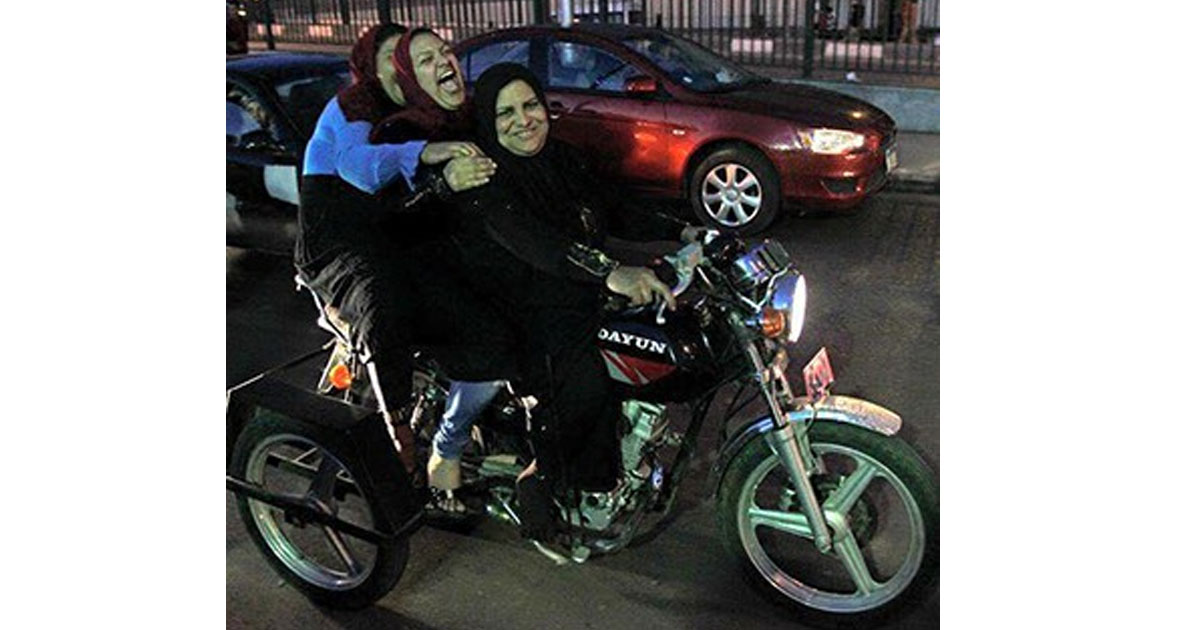Let me waste some of your time and invite you to imagine a scene that won’t ever happen in Egypt. Imagine you are hanging out in a club and suddenly a woman wearing the niqab enters! I know it would never happen because these places don’t even allow the entrance of veiled women, but let’s imagine. Do you dare to admit what your real reaction would be? You probably are finding it difficult to imagine in the first place, although her existence won’t affect the taste of your food or pollute the air. I can surely bet that you, your friends, and the rest of the audience will see her as an alien or even an extinct dinosaur. Let me take the imagination further. If the management of the place decided to conduct a survey among the audience whether they accept her existence in the place or not, what will your choice be? And if you yourself had the tendency to accept her, how many of the audience will have the same tendency? Let’s say 50%.
This is exactly what happened in the photo below, but the situation is reversed. When you realize that it’s the same situation, you will feel the exaggerated buzz that this photo made on social media. I don’t know if social media triggers the philosophical side of all of us, but from the first minute I saw this photo being shared by many of my friends, I didn’t see the point. What’s the surprise in an astonished look from veiled Egyptian girls to a foreigner wearing hot shorts? Is this is a common scene you see every day while going to work? Regardless of the ethical or religious stereotype that those girls might have for a hot girl like her, we can all agree that this scene would surprise any Egyptian even if they are in Maadi or Zamalek. So what’s the point of criticizing those girls in a disgusting manner? Why on Earth would some people give themselves the right to say that their looks looked like that of someone who is starving to death upon entering KFC!

Isn’t it’s the same situation when a veiled girl is hanging around in any European street? I, myself, have traveled to 5-6 European countries. I can’t say I was harassed or anything, but I always faced the looks of “Yes, your head looks big in this”. I didn’t think much of it then because I don’t expect a German woman or a Spanish guy who barely knows where Egypt is to be familiar with my veil, even if they are not Islamophobic.
Besides, who told those people on the virtual world that those girls wish to dress like the foreigner girl? Who claimed that every veiled girl was forced to wear the veil and is waiting for a chance to take it off, and that she envies all unveiled girls? Maybe this claim is what led some people to think that they have to call for a million-man protest for women to take off their veil!
Shifting to the other angle of the story, the so-called “accepting diversity” that liberal people on social media are wondering why we don’t have. Why can’t those girls accept someone coming from the other side of the world? The answer is very simple: because you can’t accept someone in your neighborhood because he’s just different from you, although you’re sharing the same nationality, culture and religion. You’re asking “how?” This is what I was trying to convey using the club example. An Egyptian – who grew up in a country with 80% of the population wearing the veil – opened a club and decided to prohibit the entrance of veiled women. Most of the audience of this place – who are familiar with the veil from the moment they were born – are quite satisfied that they have places to hang out at without being exposed to the diversity of others dressing differently. It might sound strange, but a large number of my friends were happy when a well-known club in Cairo released a decision prohibiting women who wear the niqab from entering the club even if they have a membership. I’m not writing an article about the discrimination of veiled women in Egypt, but I can’t deny that I’m really angry when accepting diversity from the point of view of some people is accepting homosexuality and women who wear bikinis, but they usually have a different point of view when it comes to accepting veil and niqab. Then they “ask why can’t we accept each other?” And above all, I don’t expect all people to accept me when I’m different, because it’s not that easy as we claim with our tweets. Yes accepting diversity is difficult. Maybe that’s why when you get a job in the US, you have to first pass a diversity course, because of the different cultures you will be dealing with over there. This means that accepting diversity is something we constantly need to work on, which really means that my cake of liberation is always missing a piece. Do you dare to admit it too?
Nada Khattab
Twitter: @NadaAdelKhattab
nkhattab@mediaandmore-eg.com

